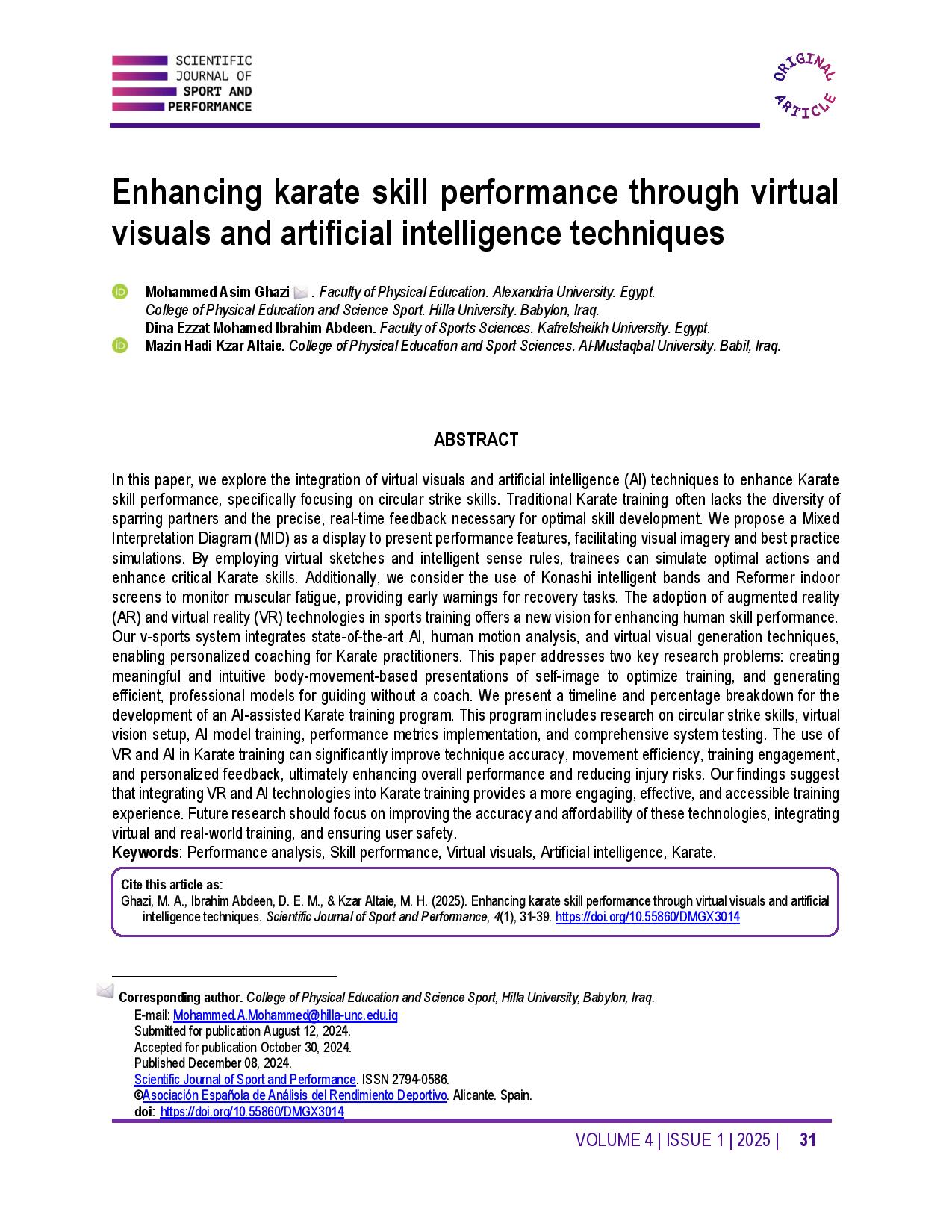Enhancing karate skill performance through virtual visuals and artificial intelligence techniques
Main Article Content
Abstract
In this paper, we explore the integration of virtual visuals and artificial intelligence (AI) techniques to enhance Karate skill performance, specifically focusing on circular strike skills. Traditional Karate training often lacks the diversity of sparring partners and the precise, real-time feedback necessary for optimal skill development. We propose a Mixed Interpretation Diagram (MID) as a display to present performance features, facilitating visual imagery and best practice simulations. By employing virtual sketches and intelligent sense rules, trainees can simulate optimal actions and enhance critical Karate skills. Additionally, we consider the use of Konashi intelligent bands and Reformer indoor screens to monitor muscular fatigue, providing early warnings for recovery tasks. The adoption of augmented reality (AR) and virtual reality (VR) technologies in sports training offers a new vision for enhancing human skill performance. Our v-sports system integrates state-of-the-art AI, human motion analysis, and virtual visual generation techniques, enabling personalized coaching for Karate practitioners. This paper addresses two key research problems: creating meaningful and intuitive body-movement-based presentations of self-image to optimize training, and generating efficient, professional models for guiding without a coach. We present a timeline and percentage breakdown for the development of an AI-assisted Karate training program. This program includes research on circular strike skills, virtual vision setup, AI model training, performance metrics implementation, and comprehensive system testing. The use of VR and AI in Karate training can significantly improve technique accuracy, movement efficiency, training engagement, and personalized feedback, ultimately enhancing overall performance and reducing injury risks. Our findings suggest that integrating VR and AI technologies into Karate training provides a more engaging, effective, and accessible training experience. Future research should focus on improving the accuracy and affordability of these technologies, integrating virtual and real-world training, and ensuring user safety.
Article Details

This work is licensed under a Creative Commons Attribution-NonCommercial-ShareAlike 4.0 International License.
References
Ait-Bennacer, F.-E., Aaroud, A., Akodadi, K., & Cherradi, B. (2022). Applying Deep Learning and Computer Vision Techniques for an e-Sport and Smart Coaching System Using a Multiview Dataset: Case of Shotokan Karate. International Journal of Online and Biomedical Engineering (iJOE), 18(12), pp. 35–53. https://doi.org/10.3991/ijoe.v18i12.30893 DOI: https://doi.org/10.3991/ijoe.v18i12.30893
Asim Ghazi, M. M. (2023). The Effect of Augmented Reality (AR) on Improving the Educational Process for Some Basic Skills in Physical Education. International Journal of Intelligent Information Systems, 12. https://doi.org/10.11648/j.ijiis.20231203.12 DOI: https://doi.org/10.11648/j.ijiis.20231203.12
Ghazi, M. A. (2024). Facial fingerprint analysis using artificial intelligence techniques and its ability to respond quickly during karate (kumite). Journal of Human Sport and Exercise, 19(2), 679-689. https://doi.org/10.55860/r05vhj78 DOI: https://doi.org/10.55860/r05vhj78
Jayasekara, S. M., Weerasinghe, S. S., Abayawardana, D. Y. W., Welagedara, A. R., Siriwardana, S. E. R., & Koralalage, M. N. (2022). Kaizen: Computer Vision Based Interactive Karate Training Platform. TENCON 2022 - 2022 IEEE Region 10 Conference (TENCON), 1–6. https://doi.org/10.1109/TENCON55691.2022.9977691 DOI: https://doi.org/10.1109/TENCON55691.2022.9977691
Jon, E. O. (2021). KUMITRON: Artificial Intelligence System to Monitor Karate Fights that Synchronize Aerial Images with Physiological and Inertial Signals. https://doi.org/10.1145/3397482.3450730 DOI: https://doi.org/10.1145/3397482.3450730
Jun-Yao, Z. J. (2022). Video Tactical Intelligence Analysis Method of Karate Competition Based on Convolutional Neural Network. Discrete Dynamics in Nature and Society. https://doi.org/10.1155/2022/6204173 DOI: https://doi.org/10.1155/2022/6204173
Mohamed, A. G. (2022). The Effectiveness of Artificial Intelligence and Strategic Planning in Building Mental Modeling to Improve Sports Performance in Karate. https://doi.org/10.55998/jsrse.v32i2.356 DOI: https://doi.org/10.55998/jsrse.v32i2.356
Witte, K., Droste, M., Ritter, Y., Emmermacher, P., Masik, S., Bürger, D., & Petri, K. (2022). Sports training in virtual reality to improve response behavior in karate kumite with transfer to real world. Frontiers in Virtual Reality, 3. https://doi.org/10.3389/frvir.2022.903021 DOI: https://doi.org/10.3389/frvir.2022.903021




